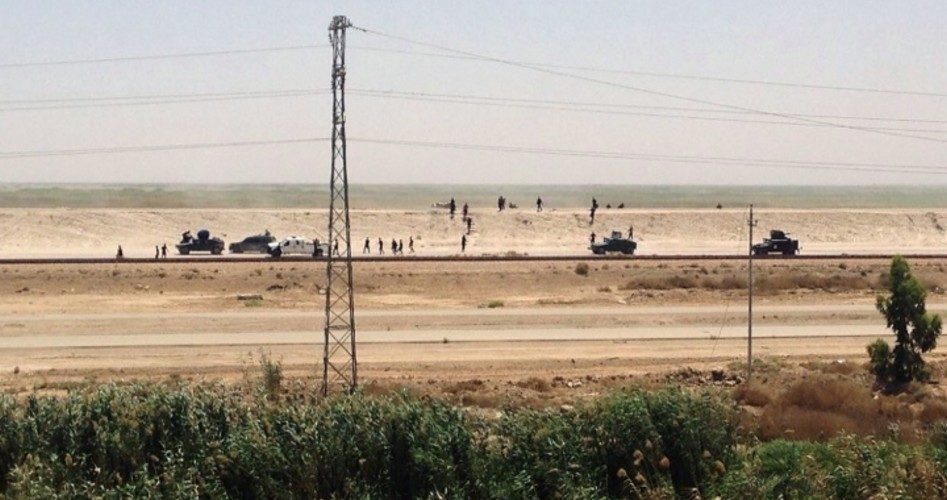
The U.S. Department of Defense confirmed Tuesday that dozens of U.S. vehicles and weapons, including tanks, armored personnel carriers, and artillery pieces, were abandoned by fleeing Iraqi troops when Islamic State forces captured the city of Ramadi in central Iraq Sunday. A Pentagon spokesman, Colonel Steve Warren, estimated that a half-dozen tanks were abandoned, a similar number of artillery pieces, a larger number of armored personnel carriers, and about 100 wheeled vehicles such as Humvees, the Associated Press reported.
The fleeing Iraqi troops and the abandonment of U.S. weapons are nearly a replay of what happened when ISIS captured the northern Iraqi city of Mosul last June. It also follows what the AP described as “a pattern over the past year” of Iraqi forces leaving behind arms and equipment that the U.S. has to destroy in later airstrikes against ISIS.
The rout brought renewed criticism of President Obama’s strategy of limiting the U.S. role in the fight against ISIS to an air war and Special Operations missions, while relying on local and regional forces to provide the combat units for the ground war.
“The president’s plan isn’t working. It’s time for him to come up with overarching strategy to defeat the ongoing terrorist threat,” said House Speaker John Boehner (R-Ohio).
The air war by U.S. and coalition forces began last August. In his September 10 speech to the nation on the conflict, President Obama laid out his strategy to “degrade and ultimately destroy” the Islamic State forces, while pledging he would not commit U.S. ground forces. But it was not until February of this year that the president sent Congress a proposed Authorization for Use of Military Force against the Islamic State, despite the fact that the Constitution assigns to Congress the power to declare war. Congress has yet to act on the AUMF resolution.
The loss of Ramadi takes some of the glow off the Delta Force raid in Syria on Friday that killed Abu Sayyaf, an Islamic State leader who U.S. officials said oversaw the group’s oil and gas operations. Derek Harvey, a retired Army colonel and former Defense Intelligence Agency officer who served multiple tours in Iraq, told the Associated Press that while the extremist group has many problems and weaknesses, it is “not losing” the war.
“They are adaptive and they remain well armed and well resourced,” Harvey told the AP. “The different lines of operation by the U.S. coalition remain disjointed, poorly resourced and lack an effective operational framework, in my view.”
White House Press Secretary Josh Earnest said President Obama has always been open to suggestions for improving the strategy for combatting ISIS. “It’s something that he’s talking about with his national security team just about every day, including today,” Earnest said. But the chairman of the Joint Chiefs of Staff on Monday issued a written statement saying the Ramadi defeat would trigger no change in the U.S. approach to the war.
“Setbacks are regrettable but not uncommon in warfare,” General Martin Dempsey said. “Much effort will now be required to reclaim the city.”
The loss might lead to further calls by congressional Republicans for Obama to abandon a strategy that rules out the use of U.S. infantry units. In a joint appearance on the CBS program 60 Minutes in January, both Speaker Boehner and Senate Majority Leader Mitch McConnell (R-Ky.) called for Obama to abandon that pledge.
The effort “will require boots on the ground,” McConnell said at that time. “The question is whose boots? I think it’d be a very foolish mistake for us to say in advance what we won’t do. Nobody’s advocating a use of American ground troops there at this point. But why in the world would we want to send a message to our enemies what we will or won’t do in the future?”
On the same day, on a different CBS news program, Senator John McCain of Arizona, the Republican 2008 presidential nominee and current chairman of the Senate Armed Services Committee, was calling for “more boots on the ground. I know that is a tough thing to say and a tough thing for Americans to swallow, but it doesn’t mean the 82nd Airborne,” McCain said on Face the Nation. “It means forward air controllers. It means Special Forces. It means intelligence and it means other capabilities.”
The U.S. has 4,500 military personnel in Iraq, training and assisting Iraqi troops. McCain has called for that number to be increased to 10,000 and for the establishment of a no-fly zone in Syria, along with expanded economic aid and military assistance to the so-called moderate Syrian rebels fighting the Islamic State in Syria as well as attempting to overthrow Syrian president Bashar al-Assad.
“In the Middle East, we have got to have boots on the ground,” McCain said.
Robert Gates, who served as secretary of defense during much of the Iraq war, told cadets at West Point in 2011 that another U.S. ground war in the Middle East would be more than unwise.
“In my opinion, any future defense secretary who advises the president to again send a big American land army into Asia or into the Middle East or Africa should ‘have his head examined,’ as General MacArthur so delicately put it,” Gates said.
That could explain why Congress has yet to act on the president’s request for Authorization of the Use of Military Force. Perhaps the U.S. role in the Middle East must first be examined by the Congressional Mental Health Caucus.
Photo of Iraqi security forces withdrawing from Ramadi on May 17: AP Images


